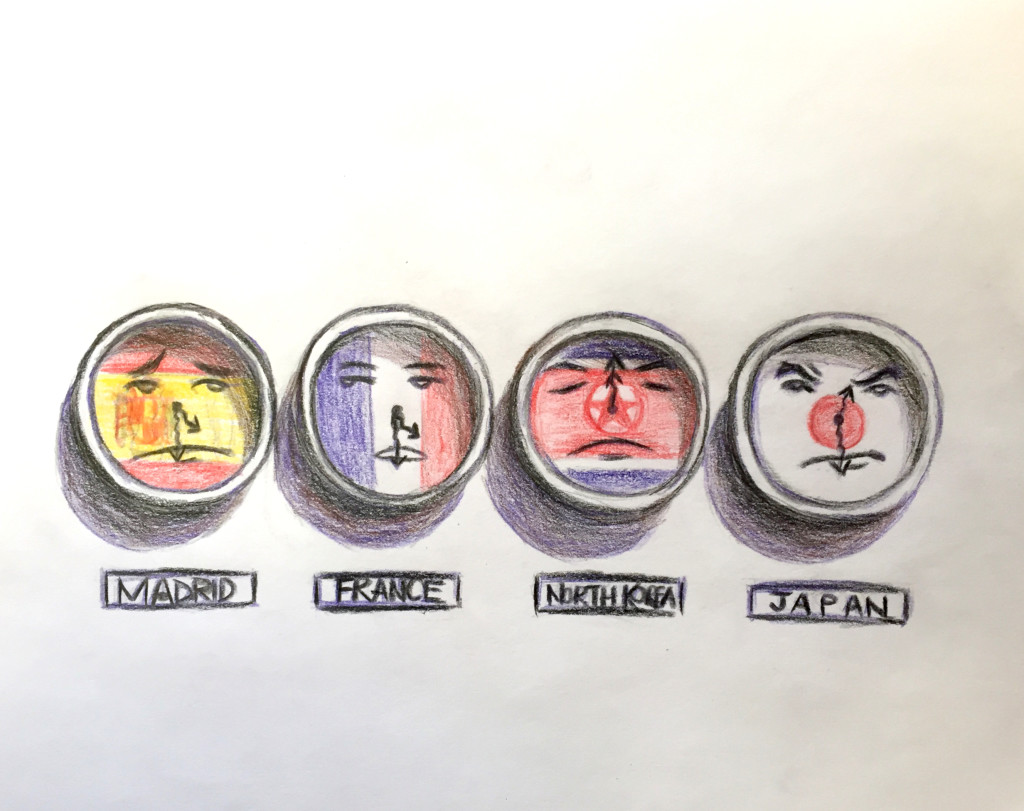 After setting its country back half a century, the North Korean dictatorship is compensating by setting its clocks back half an hour. While discarding the vestiges of colonialism often garners praise, North Korea’s new temporal separation from Japan — its bygone oppressor — seems little more than a ploy to further draw an iron curtain around the country. But time zones have substantial impacts on public policy in less hermitic nations around the globe too. Whether born out of pragmatism or the whims of an outlandish dictator, time zone manipulation can function as a geopolitical tool and often carries unintended consequences for productivity, international relations, and even happiness. As useful as bending time may seem, countries should think twice before amending their time-related policies, as not all changes run like clockwork.
After setting its country back half a century, the North Korean dictatorship is compensating by setting its clocks back half an hour. While discarding the vestiges of colonialism often garners praise, North Korea’s new temporal separation from Japan — its bygone oppressor — seems little more than a ploy to further draw an iron curtain around the country. But time zones have substantial impacts on public policy in less hermitic nations around the globe too. Whether born out of pragmatism or the whims of an outlandish dictator, time zone manipulation can function as a geopolitical tool and often carries unintended consequences for productivity, international relations, and even happiness. As useful as bending time may seem, countries should think twice before amending their time-related policies, as not all changes run like clockwork.
While warping time can make for good science fiction, the simple act of turning the hands of a clock has borne great significance for entire countries. In the same vein as North Korea, Indian leaders sought to unify their 1,200 mile-wide nation under one time zone after declaring their independence from British rule in 1947. Neighboring Nepal, which also resisted British rule, altered its time zone for symbolic reasons as well. Inspired by the time the sun rises over the famous peak of Mount Gaurishankar, Nepal reset its clocks five hours and 45 minutes ahead of Greenwich Mean Time. This temporal tinkering served both to distinguish Nepal from its hulking neighbors and to honor its mountainous culture — a romantic aim for an act as simple as turning back the clocks. Similarly, in North Eastern Sri Lanka, the Tamil Tigers rebel group operated the clocks a half an hour behind the rest of the country for years. When the government quashed the insurgency, it reunified the nation under one time, a move that religious and economic leaders alike praised for its promotion of social cohesion.
Beyond symbolic reunification, time zone manipulation offers concrete geopolitical advantages. The temporal alterations instigated by Russian President Vladimir Putin offer a contemporary example. After the invasion and annexation of Crimea in 2014, Russia moved the territory two hours ahead to Moscow time. As the Washington Post explained, time zones are a remarkably simple way to affect every citizen’s day-to-day life. If a nation’s geopolitical goal is to swing a big stick, the minute hand seems like a good way to do it.
While time zone manipulation certainly has distinct benefits for world leaders, the downsides of clock-related policies can be alarming. Initial shifts in time zones can be disruptive. The Crimean newspaper Krymskaya Gazeta warned of “sleep disorder, apathy, depression, and possible changes to the endocrine system,” as the region shifted to Moscow Standard Time. Even after the initial adjustments to changes in time zones, problems persist. A Munich University study found that people on the western edge of Germany’s time zone suffer from more sleep deprivation compared to those on the eastern edge Presumably, this is due to the fact that the sun rises 36 minutes later for the western dwellers. In 1949, Mao Zedong brought China under a single time zone in an attempt to consolidate his authority, imposing Beijing time on a country spanning 3,123 miles across. The time the sun rises can differ by as much as four hours between east and west, a problem that led to midnight sunrises, 10 a.m. dawns, and a substantial loss of productivity and health. Back in Europe, remnants of the Franco regime have left Spain stuck “in the wrong time zone,” an hour later than other countries of the same longitude. Though the resulting afternoon naps and midnight dinner reservations are key components of Spanish culture, economist Nuria Chinchilla of Spain’s IESE Business School argues that this quirk of time comes at a great cost to Spaniards. “We have no time for personal life or family life,” says Chinchilla.
Beyond productivity and health, the complexities of time-zone policy nibble at the edge of a functioning global economy. The haphazard drawing of the International Date Line (IDL) has it snaking up, down, and around seemingly arbitrary swaths of the Pacific Ocean. For years, the nation of Samoa bemoaned that its 24-hour partitioning away from its major trading partners of New Zealand and Australia was extremely economically costly. Though Samoa hopped across the IDL in 2012, other territories — including French Polynesia and even Hawaii — suffer business nuisances due to the time difference between themselves and key trading partners. Across the ocean, Hugo Chavez’s fiddling with Venezuela’s time zone is also causing economic problems. Since he moved clocks forward half an hour in 2007, citizens have complained of nightfall coming too early, costing large sums of money in the form of heating and lighting in a country with frequent gas shortages.
Although the government of North Korea has much larger problems on its plate, its recent change in time zones is just another snag in the inefficient and cumbersome system of international time zones. While manipulating time can certainly have some utility in the modern geopolitical landscape, politicians around the globe should err on the side of simplicity to help provide health, happiness, and economic prosperity to their citizens. Kim Jong-Un and Vladimir Putin should leave time warps to Doc Brown and Marty McFly.
Art by Michelle Ng

quippy af